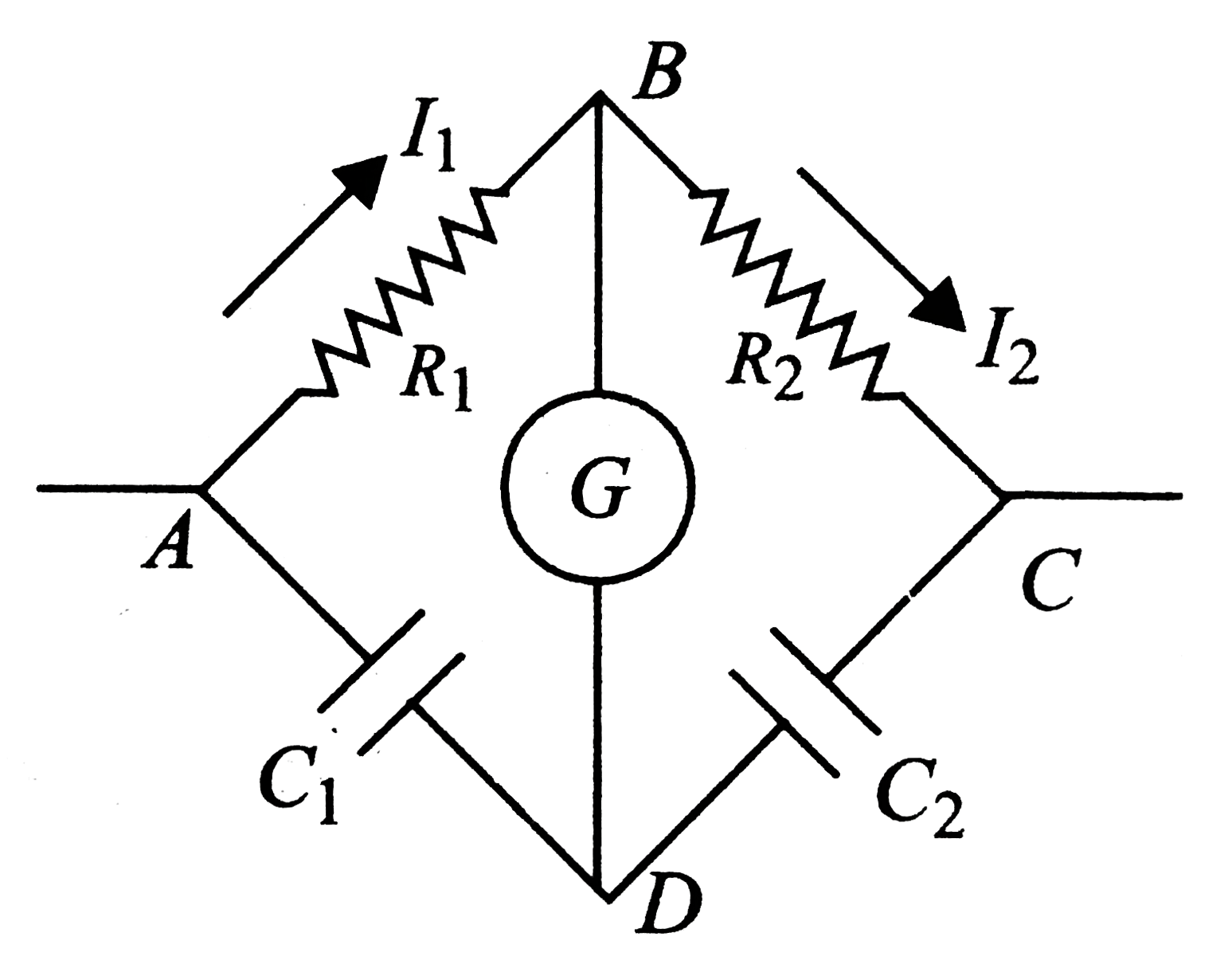A capacitor of capacitance C has charge Q. it is connected to an identical capacitor through a resistance. The heat produced in the resistance is
Q22C
Q24C
Q28C
dependent on the value of the resistance
The correct Answer is:B
In the steady state, no current is passing throughl the capacitor.
Let the charge on each capacitor be q. Since the current through galvanometer is zero,
I1=I2
The potential difference between the ends of the galvnometer
will be zero. Therfore
VA−VBVA−VD
I1R2=qC1(i)
Similarly, VB−VC=VD−VC
I2R2=qC2(ii)
Dividing Eq. (i) by Eq. (ii) we get
I1R1I2R2=q/C1q/C2=C2C1orC1C2=R2R1

Topper's Solved these Questions
- ELECTRIC CURRENT AND CIRCUITBook:CENGAGE PHYSICSChapter:ELECTRIC CURRENT AND CIRCUITExercise:Multiple Correct
Explore 16 Videos
- ELECTRIC CURRENT AND CIRCUITBook:CENGAGE PHYSICSChapter:ELECTRIC CURRENT AND CIRCUITExercise:Comprehension
Explore 35 Videos
- ELECTRIC CURRENT AND CIRCUITBook:CENGAGE PHYSICSChapter:ELECTRIC CURRENT AND CIRCUITExercise:Subjective
Explore 29 Videos
- ELECTRIC CURRENT & CIRCUITSBook:CENGAGE PHYSICSChapter:ELECTRIC CURRENT & CIRCUITSExercise:Kirchhoff s law and simple circuits
Explore 15 Videos
- ELECTRIC FLUX AND GAUSS LAWBook:CENGAGE PHYSICSChapter:ELECTRIC FLUX AND GAUSS LAWExercise:MCQ s
Explore 38 Videos
Similar Questions
A capacitor of capacitance C is given a charge Q. At t=0,it is connected to an uncharged of equal capacitance through a resistance R. Find the charge on the second capacitor as a function of time.
View SolutionA capacitor of capacitance as C is given a charge Q. At t=0,it is connected to an ideal battery of emf (ε)through a resistance R. Find the charge on the capacitor at time t.
View Solution
Knowledge Check
A 4μF capacitor is charged to 400 V. If its plates are joined through a resistance of 2kΩ, then heat produced in the resistance is
A0.16 JB0.32 JC0.64 JD1.28 JA 4μF capacitor is charged to 400 V. If its plates are joined through a resistance of 4kΩ, then heat produced in the resistance will be
A0.16 JB0.32 JC0.64 JD1.28 JA capacitor of capacitance C is allowed to discharge through a resistance R. The net charge flown through resistance during one time constant is (I0 is the maximum current)
ACRl0(1e+1)BCRl0(1−1e)CCRl0DCRl0e
A capacitor of capacitance C is given a charge go. At time t=0 it is connected to an uncharged capacitor of equal capacitance through a resistance R. Find the charge on the first capacitor and the second capacitor as a function of time t. Also plot the corresponding q-t graphs.
View SolutionA capacitor of capacitance as C is given a charge Q. At t=0,it is connected to an ideal battery of emf (ε)through a resistance R. Find the charge on the capacitor at time t.
View SolutionA capacitor of capacitance C is connected to a battery of emf V through a resistance R with a switch connected in series .Switch is turned on at t=0 . Find the displacement current flowing between the plates of capacitor as a function of time .
View SolutionA 4μF capacitor is charged to 400 volts and then its plates are joined through a resistor of resistance 1KΩ. The heat produced in the resistor is
View SolutionA capacitor of capacitance 10μF charged to 100V is connected to an uncharged capacitor. The effective potential now is 40 V. The capacitance on uncharged capacitor is
View Solution